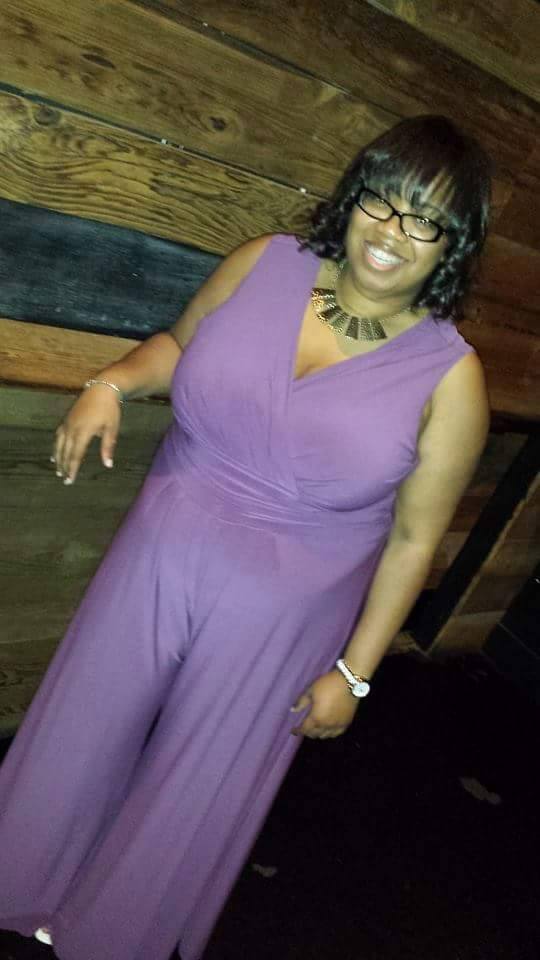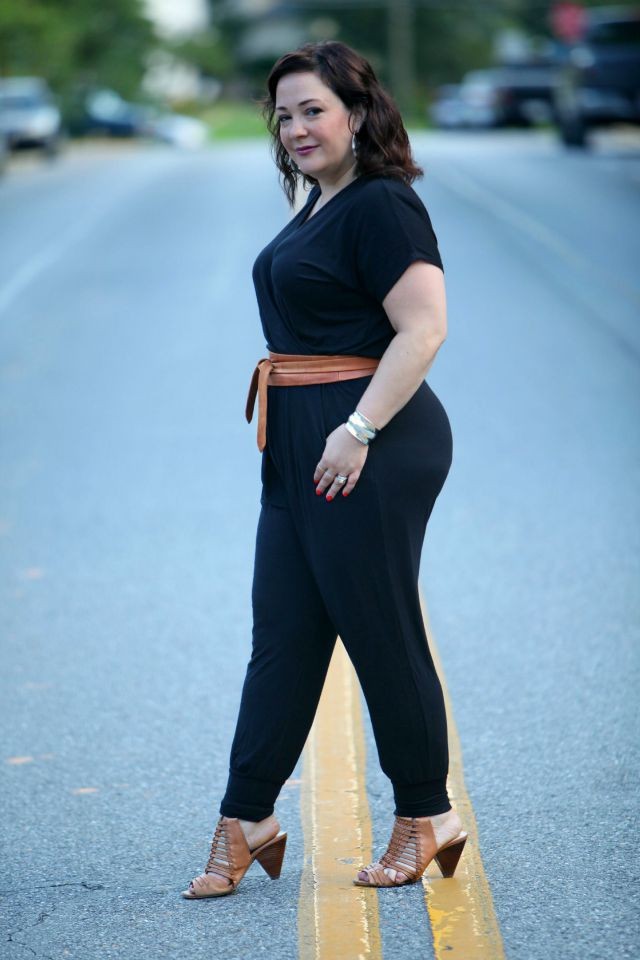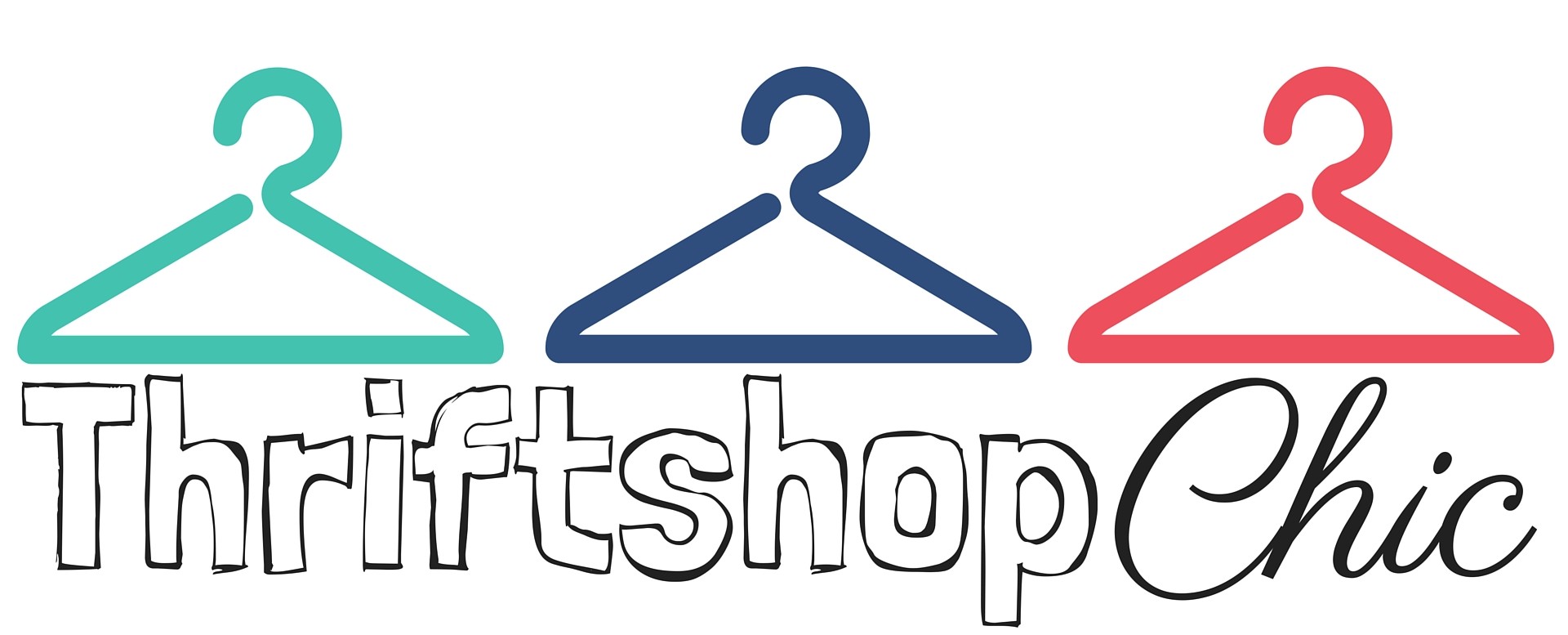Amidst the epic recent romper conversation on Facebook, we somehow transitioned into talking about jumpsuits: they appear to draw less direct sartorial inspiration from toddlers, so are they “okay”? In the course of the discussion, two folks weighed in saying that jumpsuits are fine if you are of “a very specific body type” or “as long as you are slim.”
My first thought was that they just hadn’t seen the right jumpsuits on the right women. My friend Sheena’s curves look magnificent in a jumpsuit–in fact, her lavender get-up at a brunch engagement party last year sold me on the whole idea of jumpsuits:

Photo courtesy of Sheena–yowza!
And one of my favorite style bloggers, Alison Gary, rocks a mean jumpsuit and gives tips on how to find ones that work for larger bodies and allow fuss-free bathroom visits:

But as with the romper conversation, what most intrigued me about my friends’ comments was what lay underneath them: the implication that some clothing styles are limited to women of “a very specific body type”–i.e., the current societal ideal of tall and slim (to the point of skinny). The bodies we see modeling clothes, makeup, and, well, everything. Bodies that are fine in and of themselves but, when taken in the concentrated doses we receive as consumers of media, are not representative of the range of female physiques nor affirming of the beauty of those different physiques.
I grew up, of course, surrounded by those media ideals. I also grew up with a stylish mom who gave me her eye for putting together an outfit and, inadvertently, passed on a subtle variation of those damaging standards: choosing clothing that “flatters” one’s body type.
“Flattering” doesn’t seem all that worrisome in a culture bent on more explicit body-shaming; in fact, knowing what clothing flatters you is often touted as the key to loving your body as it is. “Dressing for your body type” is supposed to help empower you and give you the confidence that you are taking advantage of your body’s assets, whatever they are. But listen to this conversation overheard by Anuschka at into mind as she next to a group of 12- and 13-year-olds on the train:
One of them wanted to buy a new pair of jeans and she talked about what kind she might want to get. “I don’t like high-waisted jeans but I have to wear them because I’m a pear shape. They are just so uncomfortable”, she said. “Just make sure you get black or dark blue ones to make your legs look smaller. And wear that with something white on top to balance it out”, said one of the other girls. “I wish I was an apple. That way I couldn’t wear tight tops, but at least I could wear dresses and short shorts. That’s good for the summer.” They all agreed.
That’s what the concept of dressing for your body type/to highlight your assets and disguise your flaws does to young women (and, I’m sure, young men).
When I think about how flattery/dressing for my body type has shaped the silhouettes towards which I gravitate and how I look at clothes on the thrift store rack, I see how the concept quietly but insistently reinforces my body as a bunch of piecemeal components, each with a negative or positive value depending on how it matches up to the aforementioned social ideals: this highlights my waist (good), this accentuates my belly (bad), this is cute but it gives me a bunch of extra width in the hips (bad).
But as a feminist, as a pastor, I want to claim my body as a whole, as ALL good–as inherently beautiful and deeply useful and even as a source of delight, a playground for fashion and self-expression (amongst other things. Ahem). And I want you to be able to do the same. Because it ticks me off when we say certain styles are only for certain people. Obviously the fashion industry has a bias toward very, very skinny models and makes clothing accordingly; but especially as clothing retailers begin to wake up and make more clothing for larger body sizes, it’s only our acquiescence to objectifying social norms that bar women from wearing styles they love. And that ain’t cool.
So I guess the title of this post is a bit mis-leading–the only thing that should be dictating whether you “can” wear a particular style or item of clothing is whether you like it. (And, I suppose, how difficult it is for you to use the bathroom in it.)
Simple concept. Revolutionary when you embrace it.
Is this re-definition of flattery as mind-blowing to you as it was to me? Does the idea of flattery/dressing for your body type feel helpful or restrictive? Do you base your look on what you love, or what you’ve been told looks good on you? Scroll down to join the conversation!
Read more at into mind’s great post on this subject. And thanks to Sheena and my other FB conversation partners for stirring up the waters on this one!


Wow, I’m the one who sold you on the idea of jumpsuits? Cool! I’d always thought the concept of “dressing for your body type” was sexist but never realized that picking what “flatters your body type” is the same thing until I read the into mind article the other day. I just want to say what you’re saying with this post is REALLY important, particularly for full-figured women. For the longest time, I thought skinny jeans were just for skinny women. I finally tried on a pair and said, “Oh my God! I look amazing in these! Why did I wait so long to try them on?!” Because of this experience, I try on anything I like now. I’ve been pleasantly surprised quite a few times. I hope a lot of full-figured women read this post. I know I will definitely be sharing it! (Also, I’m glad you addressed the question in the title of this post. Because you know I was thinking, “CAN you?!” Lol!)
Hahahaha…I love your skinny jeans experience!! That’s one of those emotional/mindset recalibrations where your whole way of seeing something changes and just the kind of experience I hope others have, so thanks for sharing the post but also for sharing your skinny jeans epiphany!!
Sheena! Girl! I don’t know you, but I’m also a full-figured gal that just found skinny jeans! I never tried them on before… but the problem I had with finding “flattering” clothes, beyond feeling stuffed into someone else’s standards, is that I couldn’t ever find something that worked for me. I was shaped differently that most “plus-sized” clothes were cut. (Bigger belly, smaller waist and butt.) I always avoided skinny jeans because, duh, I’m not skinny. But I finally tried on a pair, and wowza! I feel great. It hugs my belly, but so what? People know I have it whether I try to hide it or not! It also hugs every other part of my body, rather than hanging off like other pants did. And Leah, they are comfortable. That’s the best thing. :)
My response to your blog though is this- As a big gal, I’ve been told time after time, from the time I was a young teen, that I needed to wear dark colors because they are slimming. Sigh. A few years ago I started embracing bold colored shirts, and people love them. I know I shouldn’t get my affirmation just from what other people think, of course, but it helps. ;) People have actually stopped me in a store to say that “purple is your color! wow!” I have more slender friends who have lamented that they can’t pull off color like I can. (Again, not true.) But that is when I learned that the fashion advice that was meant to shame your body was BS. Oh, that and watching “What Not to Wear.” Seems counter-intuitive, because they are ALL ABOUT dressing to your body type, but they also taught me these important lessons: you are what you are, so you might as well look good at whatever size (I’m not too fat to enjoy putting outfits together!) & try everything on because you never know until you try it on. (the skinny jeans!)
I am so glad you found something you love, Hannah, that was outside the “shoulds” and “shouldn’ts.” (What’s that saying, “Don’t should all over yourself?”) And I LOVE that you and Sheena both love skinny jeans–I need tips from you on what kind to try because I can’t find any that are comfy!! Is the secret stretch, but not too much stretch?? Help!
Thanks also for your story about trying new-to-you colors and not sticking with darks–what a confining sartorial prison to “have to” stick to just darks, or as I so often hear for older womnen, “neutrals” because bright colors look “wrong for your age” (another post for another time!).
I do love the WNtW attitude you describe of “try it on! Who knows!” To me, thrifting makes it a lot more affordable to do just that, and if you DO succumb to someone telling you you “need” to wear something because it flatters you (or they think it’s your color but you hate it…), you’re only out a little bit of money instead of a chunk of your paycheck.
Thanks for sharing!
Hannah! Woman! We don’t know each other but I think I’d love you! LeahLW, wanna set up a meet? Lol! Also, you are so right about the dark color thing. I’ve been told that by a lot of people and I wear bright-colored clothes a lot of the time now and people love them on me too! I’ve been told I look particularly smashing in green. ;) So glad we are breaking the chains of size oppression!! Let’s continue the revolution! #TheRevolutionWillBeBlogged
I love the idea. Thoughts: it’s VERY hard to wear something just because you like it if it conflicts with the voices of society that can run rampant in your head. But I’m going to try! I constantly fight with myself considering whether my (mostly) male coworkers will even notice what I’m wearing and or are commenting negatively on it (internally or otherwise) – I’ve heard too many of them make comments about other female coworkers’ outfits. The comments are either “she shouldn’t wear that” or along the lines of “hawt.” :/
I hear you–and overhearing your male colleagues commenting on other women’s appearances doesn’t help! I find the more I practice not caring in my head–even if I just have to PRETEND I don’t care–the more it becomes reality. Sometimes fake it ’til ya make it actually works. Because listen, everyone is always evaluating everyone else in their heads, whether in positive or negative ways–but in the grand scheme of things their judgment of your appearance is probably a passing thought that takes up a lot less time/room than “oh she just had a good idea in this meeting” or “we need to solve this work crisis together” and other important LIFE tasks that revolve around your competence, not your appearance.
Good luck, keep practicing!!!
Sister,
I’m going to say this because I think it needs to be said here not because I think you don’t know it. I think it is EXTREMELY sexist that men at your PLACE OF WORK are saying OUT LOUD that a woman shouldn’t be wearing whatever she’s wearing. Who made them the judge and jury of everybody?! Nobody, that’s who. They’re not commenting on what other men are wearing so they shouldn’t be commenting on what women are wearing either. Wear what you want and if they have something negative to say, call them on it. Or don’t. It’s your prerogative. But for damn sure, don’t let THEM stop you from living the way YOU want! Ok, I’m done. For now. ;)
Aww, thanks, Sheena! Great advice and I’ll take it to heart. They can be super sexist but it’s usually not to your face… harder to stomp into the ground and crush with the heel of whatever shoes you like best. :)
As a feminist myself, I find most of the rules much more liberating and useful than restrictive. They have helped me figure out how to honor and enjoy the colors and shapes of my body. They have also helped me build influence in my social circles.
A few things I’ve learned from the rules: how to draw people’s eyes to my face instead of overwhelming my face with too much color (people used to not look me in the eye, they were so distracted by the color!), how to use cut and pattern to communicate capability at work. And having people look me in the eye with respect makes a huge difference in how I feel.
That being said, there are a few rules that I agree with artistically but not practically or ethically. For example, while heels look great from an artistic standpoint, they feel very demeaning to me as a person. They imply that I’m not good enough at my natural height, and that I need to compensate for that by enduring great physical discomfort. So many studies have highlighted how bad they are for our backs and feet. They are also a huge safety hazard in terms of being able to respond to any kind of threat or urgency. So that’s one rule I don’t follow anymore.
Ginna, I love your view of aesthetics as a tool for redirecting people in a way that enforces worth and respect! It reminds me of the idea of learning “how to wear this ensemble instead of it wearing me.”
I struggle with the idea of using cut/pattern to communicate capability at work–because why should how we’re dressed say anything about our abilities? But we do communicate with our clothing, like it or not, and your term “communicate capability” is probably the best way I’ve seen it phrased! I was taught that you dressed a certain way for certain occasions and didn’t really question the idea of “professionalism”/communicating competence in dress until I saw how it skewed towards men’s ways of dressing, e.g. women are seen more professional the closer they get to a suit and sensible dress shoes. Men have more limited options, true, but it shields them from making the “wrong” decision sartorially speaking; there’s a lot more room for women’s clothing choices to be seen as “not professional enough,” or in a case of damned-if-you-do, damned-if-you-don’t, more conservative ensembles coming across as “too stiff/bossy/bitchy” etc. (Google Hillary Clinton pantsuit.)
Women’s outfits are fair game for public critique in a way that men’s aren’t. (See “Sister”‘s comments below or read this article–who cares what David Cameron or Barack Obama wears? But we’re all over Hillary and Nicola Sturgeon’s choices.) A classic example in my field is that you will NEVER hear male preachers’ shoes or tie commented on (except maybe a bow tie), but female preachers’ shoes, hair, etc. are all up for grabs and sometimes you’ll get comments on what you’re wearing as much as on your sermon.
High heels–I completely agree! So rad, so not happening on my feet. I saw what it did to my professional mom in the 60s/70s and said “no thank you.” Lovers of flats and reasonable wedges, unite!! :)